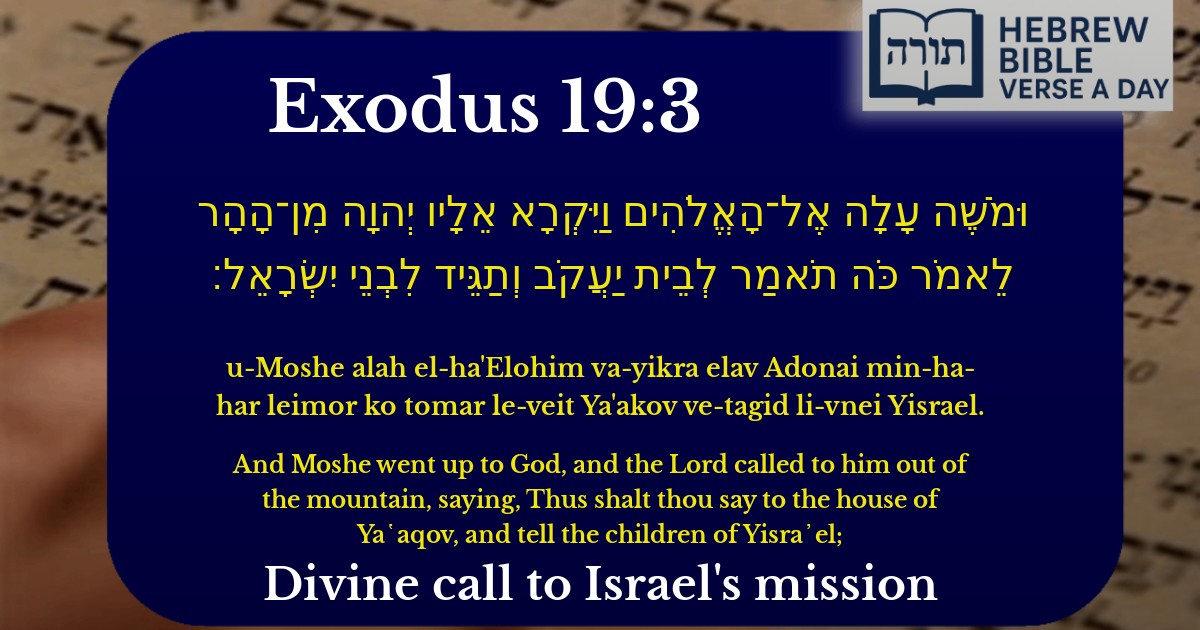Frequently Asked Questions
Q: What does it mean that Moshe went up to God in Exodus 19:3?
A: According to Rashi, Moshe ascended Mount Sinai to receive the Torah. This was a unique moment where God called to Moshe from the mountain, marking the beginning of the revelation at Sinai. The 'going up' signifies Moshe's spiritual elevation to receive divine communication.
Q: Why does the verse mention 'the house of Yaakov' and 'the children of Yisrael' separately?
A: The Midrash explains that 'the house of Yaakov' refers to the women, while 'the children of Yisrael' refers to the men. God instructed Moshe to address the women first, teaching them the Torah in a gentle manner ('כֹּה תֹאמַר'), and then present the full details ('וְתַגֵּיד') to the men. This highlights the importance of including all of Israel in the covenant.
Q: What is the significance of God calling Moshe from the mountain in this verse?
A: The Talmud (Berachot 63b) teaches that God's call from the mountain symbolizes that Torah is not in heaven but must be transmitted through human teachers like Moshe. The mountain represents the elevated nature of Torah, and God’s call emphasizes that divine wisdom is accessible to those who seek it with sincerity.
Q: How does Exodus 19:3 relate to the giving of the Torah?
A: This verse introduces the events leading to Matan Torah (the Giving of the Torah). Rambam explains that Moshe’s ascent prepared him to receive the commandments, which he would later teach to Bnei Yisrael. It marks the transition from physical liberation (Yetziyat Mitzrayim) to spiritual elevation through Torah.
Q: What lesson can we learn from Exodus 19:3 today?
A: The verse teaches the importance of proper Torah transmission—clear, respectful, and inclusive of all Jews. Just as Moshe was instructed to teach both men and women appropriately, we must ensure Torah is taught in a way that resonates with every individual, preserving its holiness while making it accessible.


Moses' Ascent to God
The verse states, "And Moshe went up to God" (Exodus 19:3). Rashi explains that this ascent was not merely physical but also spiritual, representing Moses' unique closeness to the Divine. Unlike other prophets who received visions in dreams or parables, Moses communicated with Hashem directly, as it says, "mouth to mouth I speak with him" (Numbers 12:8). The Midrash Tanchuma (Yitro 11) adds that this ascent prepared Moses to receive the Torah on behalf of the Jewish people.
The Divine Call from the Mountain
The verse continues, "and the Lord called to him out of the mountain." The Ramban (Nachmanides) notes that the mountain—Mount Sinai—symbolizes permanence and stability, teaching that Torah is an eternal covenant. The Sforno emphasizes that Hashem initiated this call, demonstrating His desire to establish a relationship with Israel through the giving of the Torah.
Distinction Between "House of Yaakov" and "Children of Israel"
Hashem instructs Moses: "Thus shalt thou say to the house of Yaakov, and tell the children of Yisrael." Rashi, citing the Mechilta, explains that "house of Yaakov" refers to the women, while "children of Yisrael" refers to the men. This teaches that the Torah was given first to the women because they are the foundation of the Jewish home and ensure its transmission to future generations. The Kli Yakar expands on this, noting that women's spiritual sensitivity makes them essential partners in accepting the Torah.
Preparation for Matan Torah
The Ohr HaChaim highlights that this verse sets the stage for the giving of the Torah, emphasizing unity—both between men and women and among the entire nation. The Talmud (Shabbat 88a) teaches that Israel's acceptance of the Torah at Sinai was only complete when they reaffirmed it willingly in the days of Purim, showing that true Kabbalat HaTorah requires ongoing commitment.